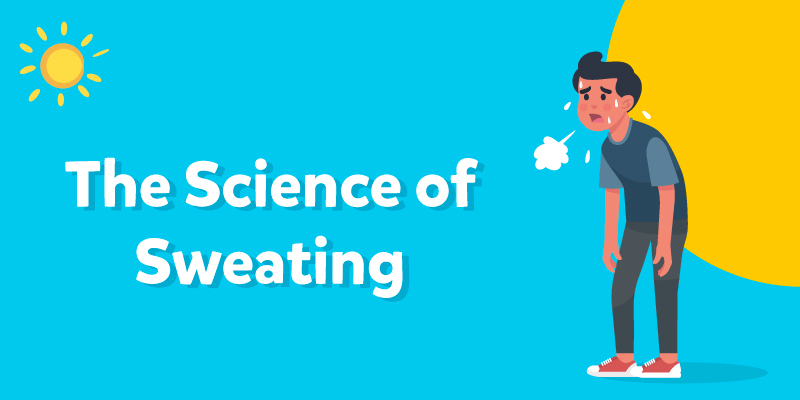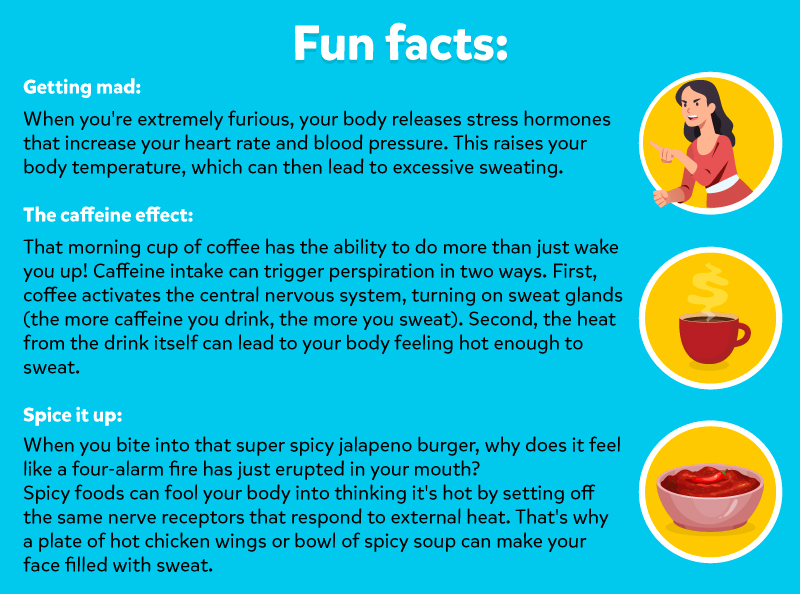
Sweating can be messy, sometimes even stinky, but did you know that it’s your body’s natural cooling mechanism? If not, we have got the answers! For how often we experience it, there’s actually a lot of interesting and really weird things a lot of us don’t know about sweat – what sweat is composed of, how genetics affect it, or the effect of the foods we eat, the amount of exercise our body gets and more. So, let’s get started with the basics first.
Sweat is a liquid waste excreted from our bodies and produced by the sweat glands present in our skin. It is composed mostly of water but it also contains sodium, potassium, calcium and magnesium. Someone who is not very healthy and is not in shape tends to lose more sodium in their sweat than a person who is fit. However, everyone’s sweat is slightly different. If your sweat is salty, meaning it stings your eyes, leaves a gritty feeling on your skin or produces a sting on an open wound, then you know you’re losing sodium, which you can easily replace with readily available sports drinks.

Sweat itself does not smell and is odourless, however, body odour may occur when bacteria on the skin break down acids contained in the sweat produced by apocrine glands (Apocrine glands in the skin and eyelid are sweat glands and their secretions usually have an odour), which are located in our armpits, breasts, and the groin. This bacteria’s waste products are what produce the stinky smell when we sweat.
It depends on a variety of factors. The first one being your body size. Bigger people tend to generate more heat because they have to move more body mass, and that leads to more sweating. The greater surface area that comes with a larger body also requires more perspiration to cool it down.
Second factor is age. Your body becomes less tolerant to heat as you age. Sweat glands are also said to change with age, thus reducing the body’s ability to cool itself effectively.
Muscle mass is also a significant factor. Put simply, muscle mass is the amount of muscle present in your body, including skeletal muscles, smooth muscles, and cardiac muscles. It can be measured as part of your total body composition, along with fat mass and bone mass. Muscle mass is said to produce more heat than fat. So even if two people have the same body weight, their sweat rate will differ based on their percentage of muscle mass.
A number of health conditions and life stages can impact how much you sweat. Colds, flu and even mental health conditions such as anxiety and depression can impact how much you sweat.
External factors also play a significant role in how much a person sweats. If you’re running outside in 95-degree heat (35-degree celsius) with 70 percent humidity, or participating in a hot yoga class, your body will sweat to keep your internal temperature down.
When exposed to hot conditions, sweating is one of the primary methods your body uses to control its temperature. Sweat, as it evaporates, helps cool down the skin. Blood vessels feeding the skin also dilate, which allows warm blood to flow to the skin surface. This helps to remove heat from the body core. However, these responses become less effective as we begin to age and thus the body’s ability to dissipate heat gets compromised.

Does the stress of upcoming exams make you sweat? What other instances can you think of that lead to sweating? Let us know in the comments below.
Enjoyed reading this? Visit The Learning Blog for more cool stuff!
1. Does sweating burn fat?
No, sweating is the body's way of cooling itself and does not burn fat.
2. What are benefits of sweating?
Sweating helps regulate the body's temperature, improves cardiovascular health and helps your skin.
3. Is sweating a lot good for you?
While sweating is healthy, excessive sweating may indicate some health issues.
4. Is all sweat dirty?
Sweat itself is not dirty and is mostly just water. It feels dirty after it has been on your skin along with other skin bacteria and dirt.
Writing has always been Shreesha’s passion, be it for imparting knowledge or expressing opinions. In her former role as a journalist, she contributed to enriching society with knowledge. Now, at BYJU’S, she has moved on to something more exciting – creating tailor-made content for students. When she is not writing, you would find her looking for new ways to engage her child.